Search Results
Showing results 21 to 40 of 70
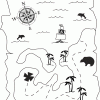
Treasure Hunters
Source Institutions
Learners use their opponent's clues and a compass rose to find the hidden treasure on a map. Learners use problem solving and coordinate grid skills as they hunt for treasure.
Number Flips
Source Institutions
In this math activity, learners play a number game to explore the relationships between numbers, combinations, and the concept of equivalency.
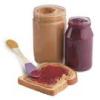
Peanut Butter and Jelly Robot
Source Institutions
This is an activity about robotics programming. Learners will discover how precise programmers have to be as they instruct a friend to make a peanut butter and jelly sandwich.

Fun Fruit: Advanced
Source Institutions
This math challenge, played with two players or a whole group, engages your problem solving skills.
Six Squares: Geometry and Design
Source Institutions
In this activity, learners take a turn contributing a closed figure made of six squares to a large grid; each must be different from all the others on the grid so far.

Hidden Rainbow
Source Institutions
In this math puzzle, one player hides a rainbow of four colors while another player tries to guess the hidden rainbow colors in the correct order.
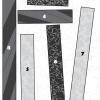
Paper Puzzle
Source Institutions
In this math activity, challenge learners to make two equal rows from eight different paper strips. Learners can explore the many ways they can solve this problem.
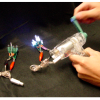
How can You Demonstrate the Efficiency of Different Light Bulbs?
Source Institutions
In this activity, learners actually feel the difference in energy required to light two different types of light bulbs: incandescent light and LEDs.
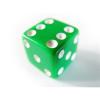
Nice and Nasty
Source Institutions
In this math game, learners throw dice and place the numbers in one of four boxes. Learners repeat this three more times and the learner with the largest four digit numbers is the winner.
Size Them Up: Learning About Volume and Capacity
Source Institutions
In this activity, learners will put a set of containers in order by capacity. Would the tallest container hold more or less water than the wide, short one?
Fair Shares: Predict Equal Shares
Source Institutions
Use this activity to build division and number sense into any snack time or whenever there is a limited set of things to share among a group: If we deal these out, could everyone get two pieces?
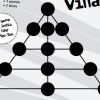
Katta Villayatu
Source Institutions
In this activity, learners play a game from India similar to Tic-Tac-Toe. Players take turns placing coins on the game board and sliding the coins along the spaces.
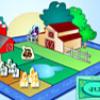
Bet the Farm
Source Institutions
This is an online game about the complexities of farming. Learners will "draw" cards and make decisions about how to take care of their farm.

Sumo
Source Institutions
In this version of a Sumo wrestling bout, players use mathematical skills to move their opponent's counter beyond the track and "out of the ring." Learners reveal playing cards and the player with the
Narrow It Down: Asking Yes-No Questions
Source Institutions
In this activity, the learner asks yes-no questions to identify a secret object (similar to Twenty Questions). This game is easy to adapt for different ages and different kinds of contexts.
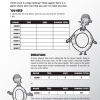
100 or Bust
Source Institutions
In this Cyberchase activity, learners play a game where zero can help them win--or make them lose! Learners roll the die and place a zero in the tens or ones place.
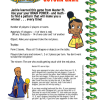
Gotcha Game
Source Institutions
In this Cyberchase activity, learners play a simple game using 15 paper dragons (or any 15 objects). One of the 15 dragons is red. Learners try to make their opponent take the red piece.

Exploring Earth: Rising Sea
Source Institutions
“Exploring Earth: Rising Sea” is a hands-on activity demonstrating ways to use topographical mapping techniques to track changes in sea level. The activity is connected to current NASA research.

Paper Airplanes
Source Institutions
In this activity, learners explore the properties of paper by constructing and modifying paper airplanes.

Stethoscope
Source Institutions
Make a copy of the first stethoscope with only a cardboard tube! René Laennec invented the first stethoscope in 1819 using an actual paper tube!
